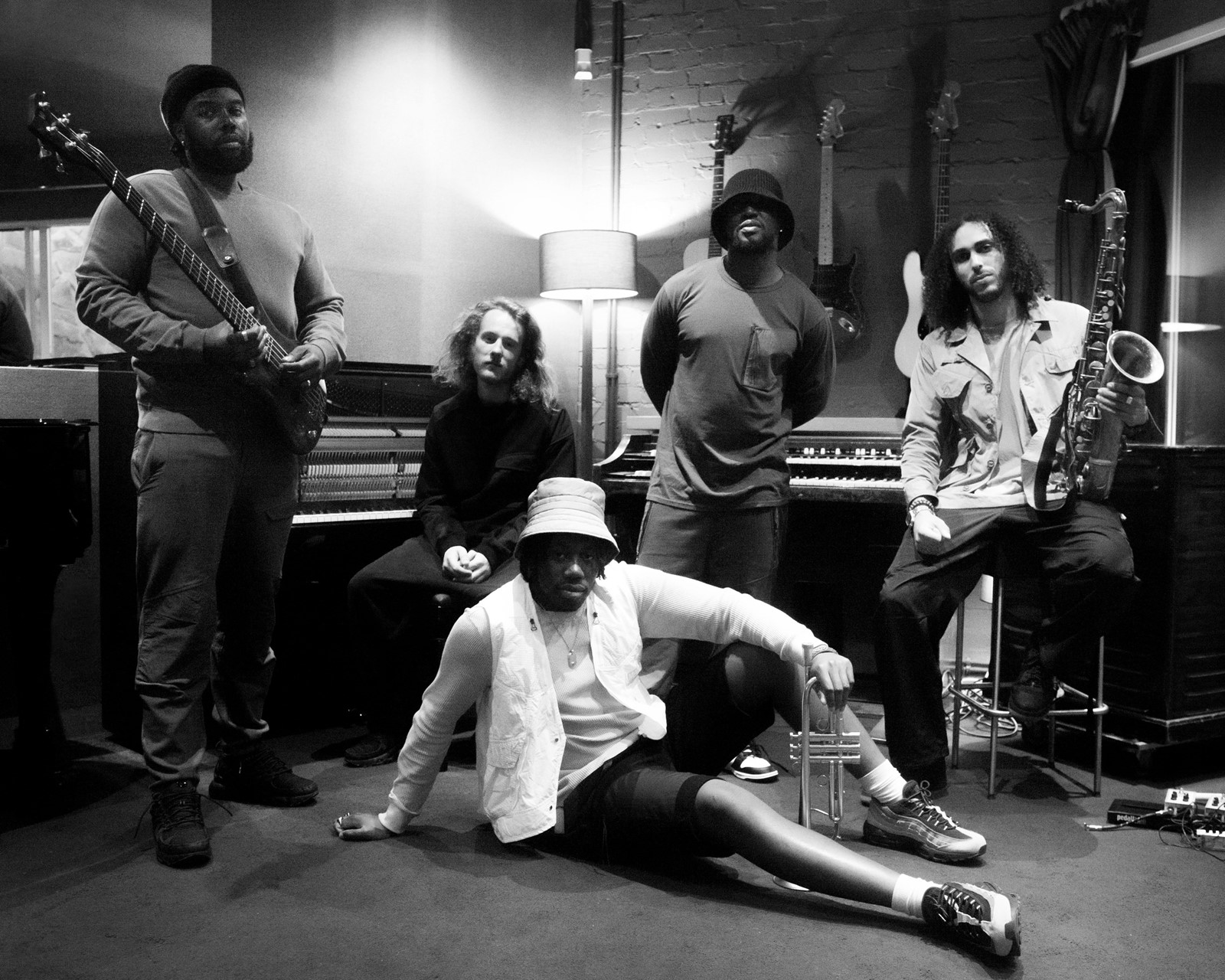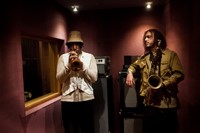The UK jazz scene is officially in its golden era, filled with an abundance of talented, forward-thinking musicians carrying the torch for those who came before them. Spearheading this movement are the London-based quintet Ezra Collective, who burst onto the scene in 2019 with You Can’t Steal My Joy – an unabashedly joyous blend of Afrobeat, reggae, salsa, and hip hop.
The group’s new album Where I’m Meant To Be, out this week on Partisan Records, is a continuation of their emotive, celebratory approach. But there’s a greater sense of urgency this time around – from album opener Life Goes On (featuring Sampa the Great), it feels as if there’s barely any time to breathe, with stabbing horns and pounding drums igniting a fire that blazes through each of its 14 tracks. As well as reaching new heights of musicality, the record – which also features Kojey Radical, Emeli Sandé, Nao, and spoken contributions from Tony Allen and Steve McQueen – is a melting pot of genres, with echoes of J Dilla, King Tubby, and Fela Kuti.
Written and recorded over lockdown, Where I’m Meant To Be is a statement about the beauty and power of camaraderie. At a time when isolation and confusion were rife, the recording studio – an unassuming, church-like building on a quiet trading estate in north London – offered the band a space of solace and creativity. “This building saved my life in some ways,” Femi remarks as he looks around the space today.
At its core, the album is just five friends escaping from the bleak reality of lockdown life through playing music. Ezra Collective understand the importance of music and how deeply it impacts people’s lives – and that might just be their biggest strength as a band.
Louis Merrion: Do you think there are specific reasons that the jazz scene in the UK is so unique when you compare it to, say, what’s going on in the States at the moment?
Femi: The premise of jazz, since even before Charlie Parker, has always been to take different elements and put them together. If you listen to Dizzy Gillespie, it was big band swing mixed with bebop and Afro-Cuban music. Miles Davis was clearly listening to film soundtracks and classical music, and then mixed it with jazz on Birth of the Cool.
We’re Londoners; grime is London, grime is UK. Contrary to what some might say, Jamaican music hits stronger in the UK than it does anywhere else outside of the Caribbean. As a Black man that grew up in London, the influence of bashment, dancehall and reggae was strong. While an American might look at their grandfather listening to jazz, we look at our parents’ record collection and see music like Fela Kuti because we don’t have that lineage – we have a different one that goes straight back home. My parents were born and bred in Nigeria, so I think those sounds [seep into the record] and make it so uniquely London. The closest city I can think of that has that type of cultural melting pot will be down the road in Birmingham.
TJ: That’s also the premise of art. Art is creation, but it’s creation from creation. Unless you’re God, you need something else to base your creation on. You use different elements in different ways to create something new. Any artist that tries to create something without having a good look at themselves and the past, is probably going to get stopped quite early. The open-mindedness that has to be present as a musician is encouraged in London: I think it’s quite difficult to be closed-minded. We grew up with Nigerian parents, in a very Turkish community, with a childminder from Bangladesh. Most of my friends are from Ghana, in England. If you’re close-minded, it’s not just going to hinder your music, it’s going to hinder you as a person. This is really a celebration, I think that’s what I pin it down to. Music is such a beautiful gift where you get to express that level of unity.
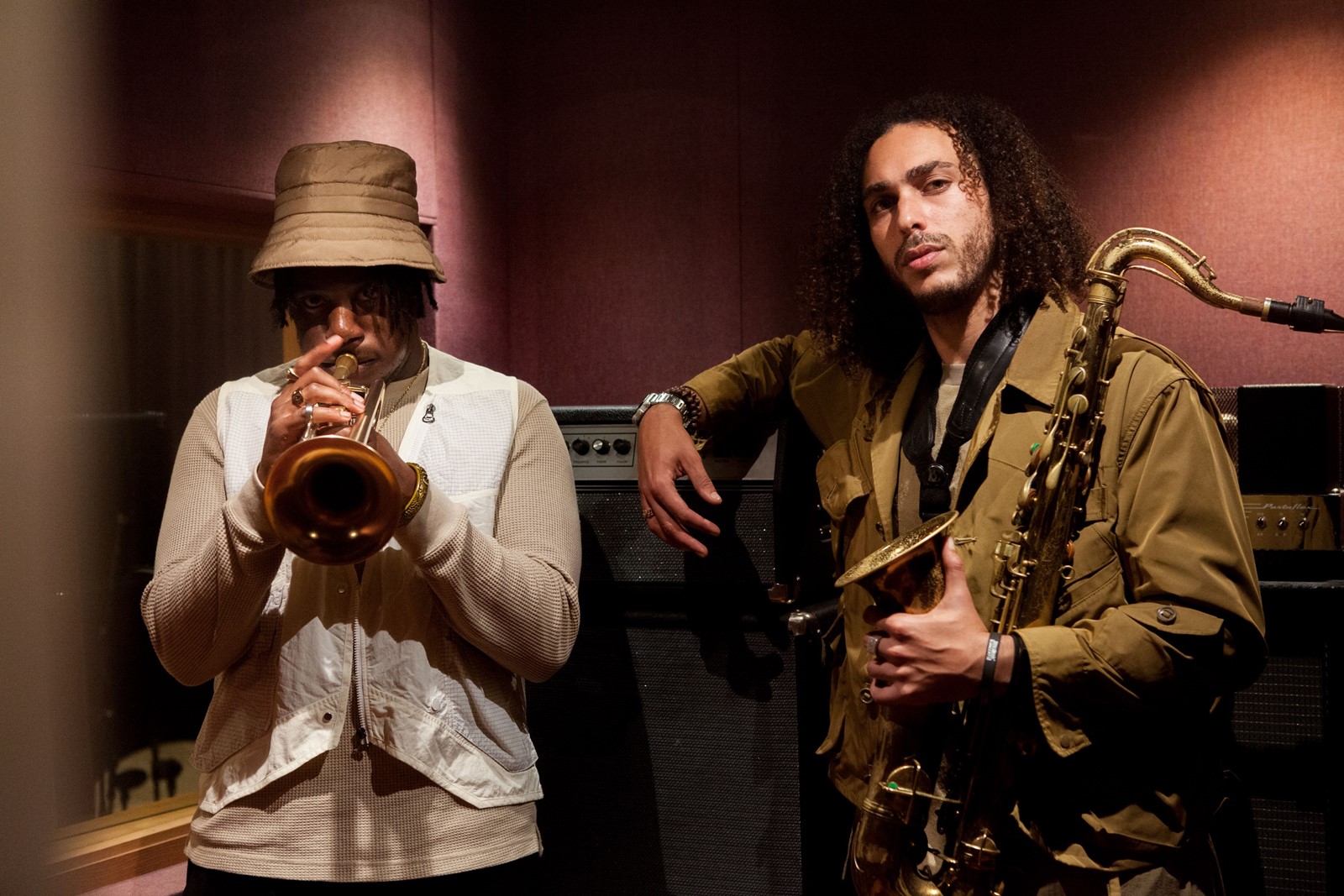
LM: Do you think you’ve changed a lot since the last album came out in 2019? And how has that affected the writing and recording process?
F: As people, we got better at communicating. I think that affected the music a lot because the recording process was more of a collaborative process. With You Can’t Steal My Joy, I don’t remember in-depth conversations about adding a synth there or not, putting percussion there or not … that process was difficult. What would often happen is we would put something out that only half of us were happy with, because we didn’t know how to communicate those differences. Whereas with this album, there were long conversations. We mentioned this earlier and had a laugh about it, the drumbeat on Welcome To My World was something we were disagreeing on for months. Rather than just squaring up to each other and fighting about it, we did try a few different things. That, to me, is great.
TJ: We went into the pandemic and were still able to come together while everyone was smashing their heads into a wall. For one day a week, we were able to just not do that and chill. Touring made us realise that there were probably some things we needed to sort out as people. It was a time of growing up. We came into the studio to record the new album, probably in the best place we’ve ever been as a band. With touring and the pandemic, you spend a lot of time staring at your face in the mirror and realising how many spots you have. I think we’re a lot more aware of our own flaws and that gives us perspective – and perspective allows you to have reasonable discourse.
Ife: After the pandemic, I also just became so much more grateful for music. We were so busy in 2019 we didn’t really get time to process what we were doing. Lockdown started off at a good time, as we had a bit of time to rest and think about things. It just made me realise how grateful we should be to play music as the five of us, because we are all friends.
“Any artist that tries to create something without having a good look at themselves and the past, is probably going to get stopped quite early” – TJ
LM: Jazz is a lot about improvisation. I always wondered how people connect so deeply that they can improvise off of each other. How does that work when you’re on stage?
F: It’s exactly the same process as this conversation right now. We’ve got a common language, which is English. I understand what you're saying, but then I’ve got to be creative with how I answer what you’re saying, and then if I’m creative enough I might make you laugh. It’s very similar with your instruments – and the longer you spend with your instrument, the more words you learn and the more eloquent you get at talking.
Joe and I have been talking to each other for coming up 12 years, so quite often when he’s soloing I can hear the direction it’s going in or it wants to go in. I’ve been playing with Ife for the least amount of time, but we’ve been playing so intensely: we probably did more gigs in 2019 than we did from 2012 to 2015. I very quickly started to learn the language he was speaking and there was a beautiful sound of disagreement in those conversations. It’s my main motivation for practicing, I’m not really that fussed about looking impressive or playing quickly anymore. I just want to be able to talk as many languages as possible.
I: So much of it is just spending time with the people that you play with outside of a music setting, it actually feeds into the music. Going on holiday, eating food, going for drinks, the more time you spend with people, the more you learn them, and then it makes it easy to play.
LM: If you could pin it down to a few albums, a few songs or just artists you were listening to, what were the most important influences on this album?
TJ: If I’m being completely honest, it was amapiano. It was just before it had the big blow-up the summer after we recorded the album.
F: Disagree with me if you need to, but I think on behalf of the whole band, the record that Sault made lashed us all. I also think Hiatus Kaiyote had a big influence on us, and Khruangbin, me and TJ specifically were trying to emulate a lot of the way they play their parts.
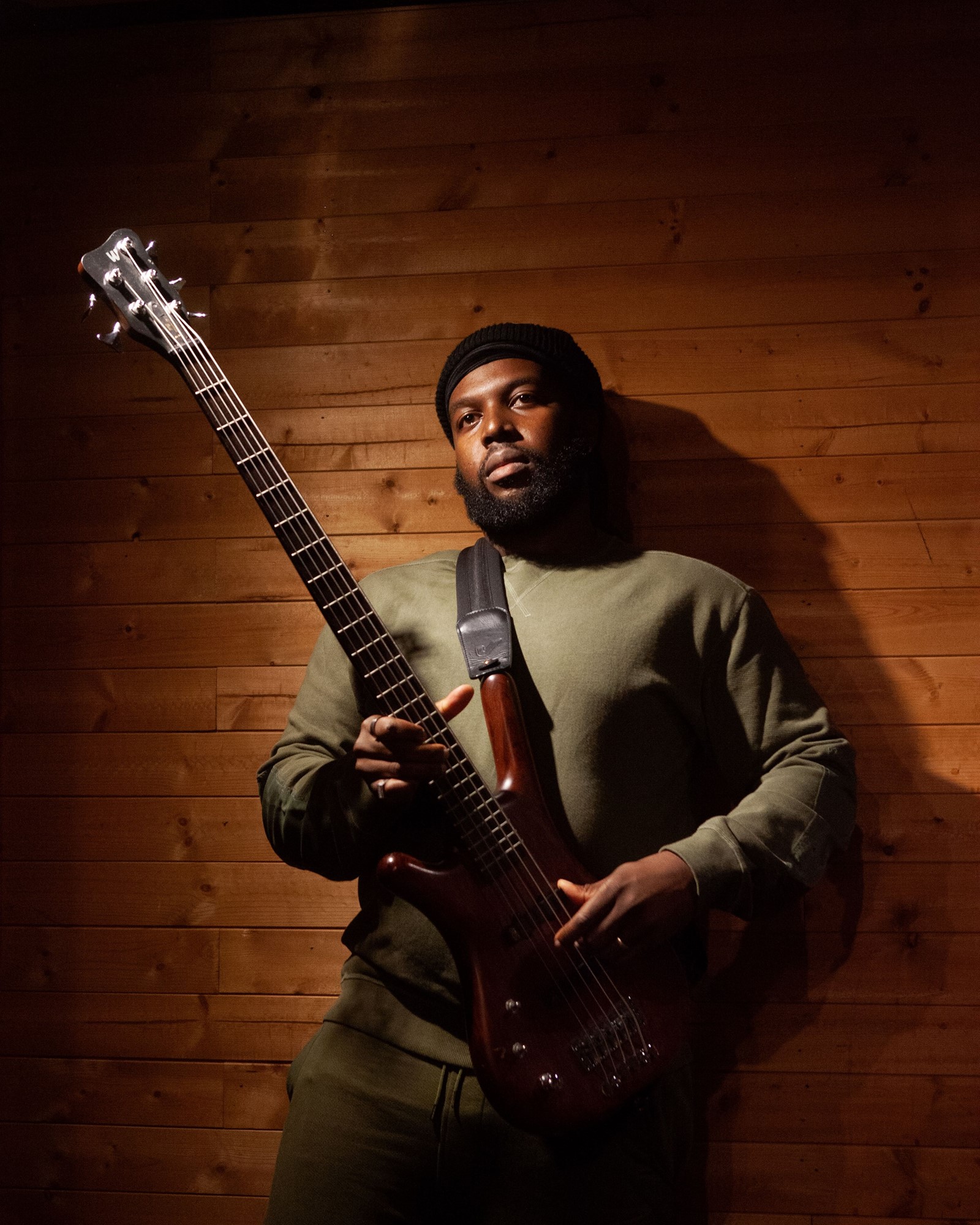
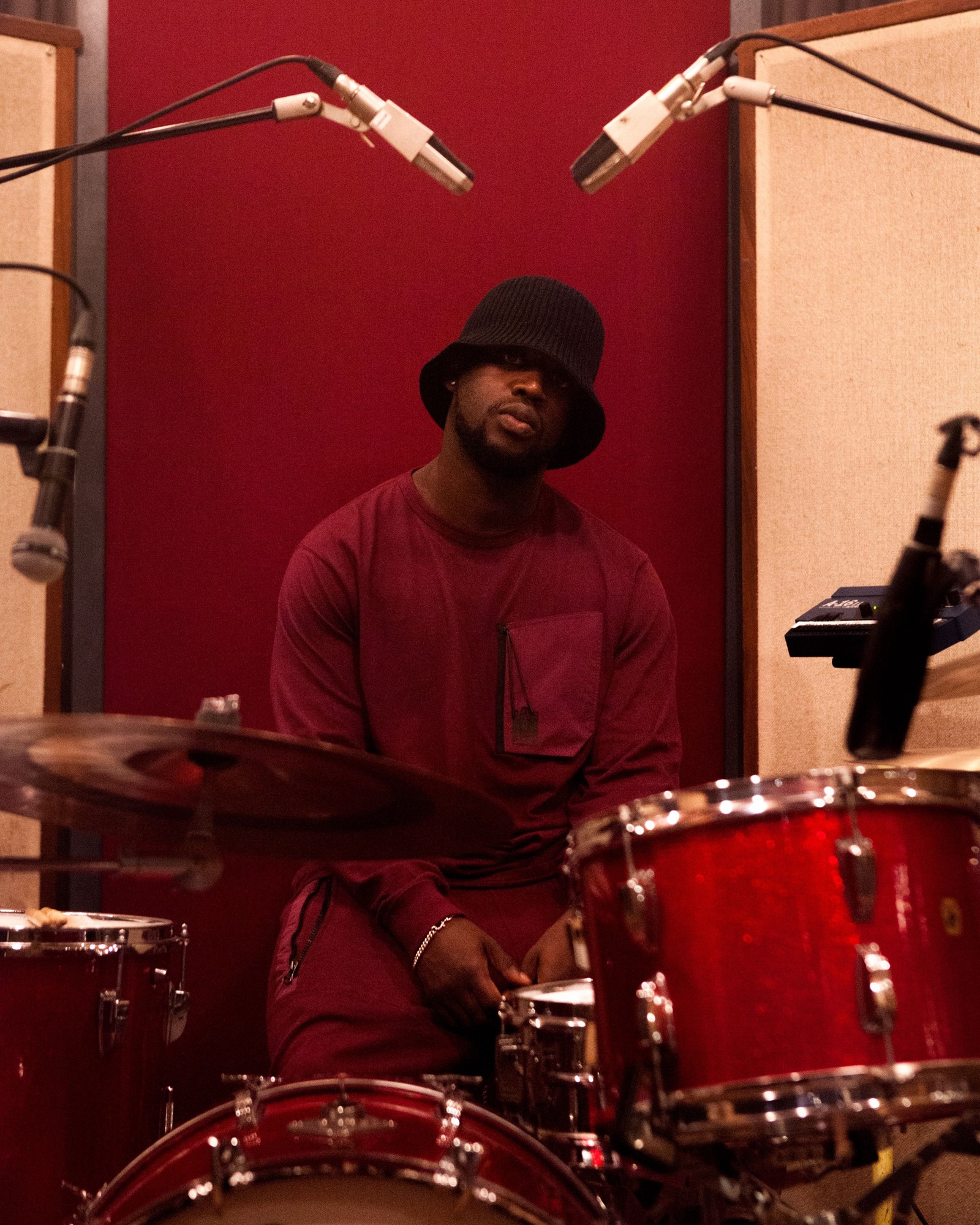
LM: The album sounds like you have really grown in confidence – like you’re not afraid to show you are good at what you do, and that you’re proud of what you have achieved as a band.
F: The only power we have is to be ourselves. As long as James sounds like James, Joe sounds like Joe, Ife is being Ife, TJ and myself the same, then we’re good. Whether people like it or not is irrelevant, the day we decide to try and be Robert Glasper will be the end. That’s where all of our confidence comes from. When I walk out on stage and I’m with these boys, we’re untouchable.
TJ: That way of thinking actually made us a bit more humble. We’re not competing and there’s this weird thing that jazz musicians do when they’re always checking each other out. I always used to think, why are you checking? We’re open, we’re not trying to do any of that stuff. We’re trying to be ourselves. It means that I get to appreciate the music more.
F: This is why we so openly talk about who influenced this and what sound influenced that … we’re not competing with anyone. I’m more than happy to use every platform I have to say Sault are hard, Kokoroko are hard. There is no competition because all it’s about is being ourselves. If there is a competition, it is to be as authentically Ezra Collective as possible.
Where I’m Meant To Be is out now on Partisan Records.
